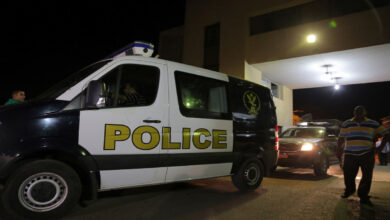The New Year's Eve bombing of a church in Alexandria has generated a host of unfounded rumors–about security threats and sectarian unrest, among other things–on the Egyptian street.
Reports of a terrorist sniper picking off policemen in Cairo’s Al-Haram district, for example, began circulating in the media only one day after the Alexandria attack, which killed 23 Coptic Christians and injured scores of others.
And on Monday, rumors spread via mobile-phone text message about the bombing of a Carrefour hypermarket in Cairo's Maadi district. Other rumors circulated about explosions that had rocked the Red Sea resort of Sharm al-Sheikh and the Nile Delta city of Bahteem.
All these rumors, however, along with several others, have turned out to be baseless.
Both the Internet and mobile-phone text messages have been widely used in recent years by opposition movements to spread the word about planned protests and marches and police crackdowns.
Experts say the ability to discern fact from rumor becomes more difficult in times of national crisis.
"Rumors tend to spread during times of crisis–following terror attacks, domestic tensions or other incidents of social upheaval," said Mohamed Megahed al-Zayyat, security affairs specialist at the Cairo-based Middle East Studies Center. "Heightened emotions allow for exaggerations and inaccuracies."
"These rumors are often spread by people and movements that aim to increase the scope of these tensions," he added. "Some individuals and groups have an interest in seeing social unrest turned into more violent manifestations."
Coptic Pope Shenouda III, for his part, has accused "elements and political bodies with certain orientations" of "infiltrating" Coptic demonstrations.
In an interview on state television on Monday, the pope stressed that not all the participants in the recent series of Coptic protests were Copts. ”Several people have simply gone with the flow and joined in the name of solidarity," he said. "But they have nothing to do with the problem."
In the three days since the bombing, thousands of Egyptians have staged massive protests to condemn the incident.
Several political and national groups have participated in the protests. On Monday, hundreds of Al-Azhar students–some of whom belong to the Muslim Brotherhood opposition group–also staged demonstrations.
Some ruling party stalwarts have hinted that the brotherhood–Egypt’s largest opposition group–has contributed to the incitement of sectarian tension in Alexandria, especially in the run-up to recent parliamentary polls. Alexandria, Egypt's second city, is considered one of the group’s strongholds.
Online social networking sites, such as Twitter and Facebook, have seen the emergence of even more bizarre rumors, including one about a "ghost" wreaking havoc along Cairo’s highways.
Al-Zayyat pointed to the difficulties associated with controlling this kind of unsubstantiated hearsay.
“The internet and mobile text messages are beyond control,” he said. "While security and intelligence agencies do monitor the Internet, only that information that poses a genuine threat to national security is controlled."
According to Egyptian law, the penalty for intentionally disseminating false information is a prison term of up to one year and/or a fine of not less than LE2500 (around US$455).
Ahead of last year’s parliamentary elections, the Ministry of Communications issued new licensing restrictions and fees for media outlets and mass SMS service providers. And in October, the ministry ordered the suspension of 12 Islamic satellite channels, issuing warnings to 20 others.
The channels were ordered closed on the pretext that they were inciting "religious fundamentalism" and "hate speech." A total of 17 television channels have been suspended since September of last year.
On 27 November, Egypt’s Supreme Administrative Court ruled against the government's new regulations on SMS messaging. Within days of the elections, the government announced on 7 December that it would cancel the restrictions it had imposed on SMS service providers.




